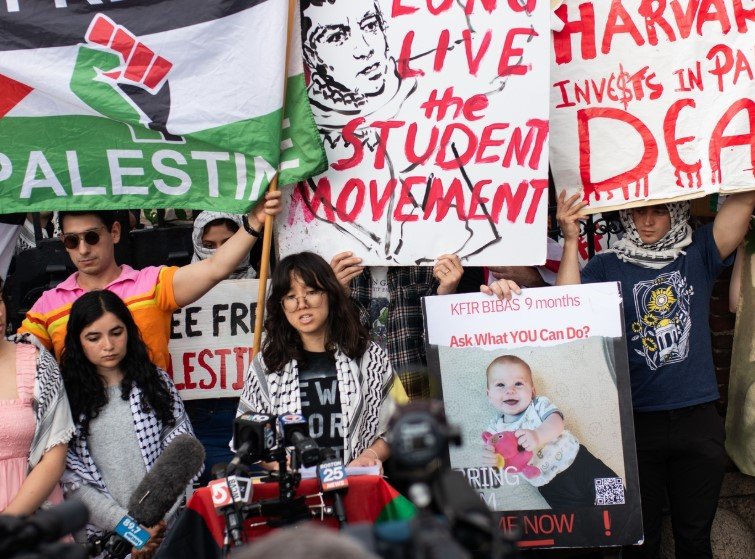Students at the American University in Cairo launched a bold protest on October 15, 2025, forcing former US ambassador Daniel Kurtzer to leave campus amid chants and demands. The action highlighted deep anger over Kurtzer’s past support for Israel during the ongoing Gaza conflict, drawing hundreds of young Egyptians in a rare show of public dissent in the tightly controlled nation.
Protest Erupts on Campus
The demonstration began as Kurtzer arrived for a scheduled talk, quickly escalating into a three-hour sit-in that blocked his path. Videos captured crowds of students, many draped in Palestinian keffiyehs and holding flags, filling halls and grounds with energy not seen on this scale in years.
Organizers from over 40 student groups united in what they called a stand for moral responsibility. They rejected the event as an attempt to normalize ties with figures linked to oppression. Security tried to manage the scene, but the sheer number of protesters made it impossible for Kurtzer and a group of visiting American graduate students to stay.

This event marks a shift at the university, known for its affluent student body and American ties since its founding in 1919. Past protests here have been smaller, like a 2019 walkout during another Kurtzer visit, but this one felt amplified by recent global tensions.
Who Is Daniel Kurtzer?
Daniel Kurtzer, now 75, built a long career in US diplomacy focused on the Middle East. He served as ambassador to Egypt from 1997 to 2001, then to Israel from 2001 to 2005, roles that placed him at the heart of peace efforts and controversies.
Today, he teaches at Princeton University and often comments on regional issues in media outlets. His views on Israel-Palestine, including support for a two-state solution based on pre-1967 borders, have drawn criticism from pro-Palestinian activists who see him as too aligned with Israeli policies.
Kurtzer’s writings, such as articles in Foreign Affairs on Saudi-Israeli relations, emphasize diplomacy but face backlash for not addressing what critics call apartheid-like conditions in occupied territories.
Key Demands from Students
The protesters made their stance clear through organized statements and actions. They demanded the university cancel the event and avoid hosting figures they view as complicit in Palestinian suffering.
Here are some core demands voiced during the sit-in:
- End all campus ties to institutions supporting Israeli policies.
- Promote academic events that amplify Palestinian voices.
- Reject normalization with officials linked to the Gaza conflict.
In a joint statement, the student union stressed this was about conscience, not just free speech. They pointed to Kurtzer’s diplomatic history as evidence of bias, urging the administration to prioritize ethical platforms.
This unity among groups is rare, as Egypt’s political climate often stifles such coordination. The protest’s success in driving Kurtzer away could inspire similar actions elsewhere.
Broader Gaza Conflict Impact
Egypt’s role in the Israel-Palestine saga adds layers to this story. As Israel’s first Arab peace partner since 1979, the country has mediated ceasefires, including a recent one in 2025 that halted major fighting in Gaza after over 67,000 Palestinian deaths.
Public anger in Egypt remains high, fueled by images of destruction and fears of displacement into Sinai. While the government allows limited pro-Palestine rallies, mass protests are rare due to strict controls under President Abdel Fattah el-Sisi.
Recent events, like Israel’s post-ceasefire bombings and aid restrictions, have tested the fragile peace. Students at AUC, influenced by global campus movements in the US and Europe, see their action as part of a wider push against perceived injustices.
| Key Events in Gaza Conflict Timeline | Date | Description |
|---|---|---|
| Start of Major Offensive | October 2023 | Israel launches assault on Gaza following attacks. |
| UN Labels Genocide | Mid-2024 | United Nations and experts declare actions as genocide. |
| Ceasefire Agreement | Early 2025 | Deal brokered by Egypt and others, but violations persist. |
| AUC Protest | October 15, 2025 | Students force Kurtzer’s exit amid ongoing tensions. |
Contrast to Trump’s Egypt Visit
The timing of the protest stood in sharp relief to US President Donald Trump’s visit to Sharm el-Sheikh just a day earlier on October 14, 2025. Trump celebrated the Gaza ceasefire in a high-profile event, flanked by world leaders including Sisi.
His speech praised the deal for preventing annexation and displacement, yet critics noted its lack of enforcement details. Israel has since violated terms with strikes and aid cuts, raising doubts about lasting peace.
While Trump’s reception was carefully managed with no public disruptions, the AUC protest showed unfiltered Egyptian youth sentiment. It underscored a divide between official diplomacy and grassroots frustration over US support for Israel.
What This Means for Future Relations
This incident could signal growing unrest among Egypt’s educated youth, potentially pressuring universities to rethink guest policies. It also highlights challenges for US soft power in the region, as anti-Israel feelings simmer amid the Gaza aftermath.
Experts suggest such protests might encourage more open dialogue on campuses, though Egypt’s controls limit broader impacts. For now, it serves as a reminder of the human cost behind diplomatic visits and ceasefires.
As this story develops, share your thoughts in the comments below or spread the word on social media to keep the conversation going.
